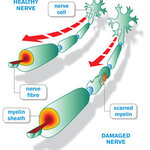
New research suggests that the hunger hormone ghrelin is activated by fats from the foods we eat in order to optimize nutrient metabolism and promote the storage of body fat. The findings, the study's author says, turn the current model about ghrelin on its head and point to a novel stomach enzyme (GOAT) responsible for the ghrelin activation process that could be targeted in future treatments for metabolic diseases.
The laboratory study, led by Matthias Tschöp, MD, UC associate professor of psychiatry and internal medicine, is published online ahead of print Friday, June 5, 2009…

